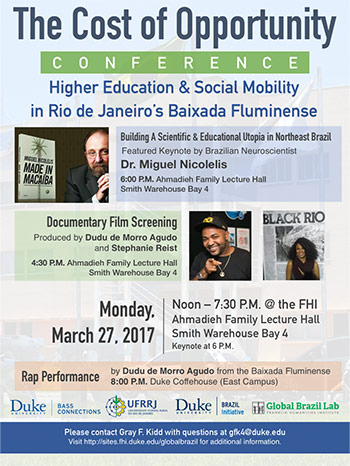March 27 Conference to Explore Cost of Opportunity Related to Higher Education in Brazil
Event will also feature documentary screening and performance by rapper Dudu de Morro Agudo
A Duke Bass Connections research team will host 17 Brazilian students, faculty, and staff in Durham March 21-27. The visiting team from the Multidisciplinary Institute of the Federal Rural University of Rio de Janeiro will join their Duke counterparts to examine the impact of increased access to higher education in the Baixada Fluminense, an economically and racially marginalized urban periphery of Rio de Janeiro.
The visit will conclude with a daylong conference on Monday, March 27, which will also feature the world premiere of a documentary film, The Cost of Opportunity, filmed in Brazil last summer.
Miguel Nicolelis, the Duke School of Medicine Distinguished Professor of Neuroscience, will deliver the keynote address “Building a Scientific and Educational Utopia in Northeast Brazil,” regarding the development of a new research institute linking maternal healthcare, K-12 education and international neuroscience in a poor region of northeast Brazil.
 The March 21-27 visit by the Brazilian team continues a Duke collaboration with the Multidisciplinary Institute of the Federal Rural University of Rio de Janeiro that began in June 2016, when five Duke undergraduates, three graduate students, and two faculty members engaged in three weeks of intensive field research in the Baixada Fluminense. Led by Duke professors John French (History) and Katya Wesolowski (Cultural Anthropology), the Duke team conducted 46 recorded interviews with UFRRJ students and faculty under the direction of graduate students Stephanie Reist and Gray F. Kidd, while learning more about the geography, history, economics, and culture of the Rio lowlands.
The March 21-27 visit by the Brazilian team continues a Duke collaboration with the Multidisciplinary Institute of the Federal Rural University of Rio de Janeiro that began in June 2016, when five Duke undergraduates, three graduate students, and two faculty members engaged in three weeks of intensive field research in the Baixada Fluminense. Led by Duke professors John French (History) and Katya Wesolowski (Cultural Anthropology), the Duke team conducted 46 recorded interviews with UFRRJ students and faculty under the direction of graduate students Stephanie Reist and Gray F. Kidd, while learning more about the geography, history, economics, and culture of the Rio lowlands.
“The much-anticipated visit of the Brazilian delegation offers a unique opportunity for Duke and the Triangle as a whole,” French said. Wesolowski noted that the ambitious exchange is a necessary one. “There is a pressing need to understand the obstacles confronting students and institutions of higher education in Brazil,” she said, “at a time when the country still falls short of providing equal opportunity for all, rich and poor, black and white.”
Alexandre Fortes, professor of history and newly elected dean of postgraduate education and research at the Federal Rural University of Rio de Janeiro, emphasized that the ongoing collaboration between Duke and UFRRJ is part of an effort “to create strategic partnerships between North American and Brazilian universities and their students and faculty.”
The Cost of Opportunity Conference will involve student and faculty presentations followed by panel discussions. The Duke and Brazilian teams will screen the documentary The Cost of Opportunity: Higher Education in the Baixada Fluminense, which emerges out of the research experience in summer 2016. The project is co-directed by filmmaker Dudu de Morro Agudo and Stephanie Reist. Dudu, a rapper who heads the community arts program Enraizados (rooted) in Novo Iguaçu, will also perform.
The March 27 conference events are free and open to the public and will be held in the Ahmadieh Family Lecture Hall in Bay 4 in the Smith Warehouse on Maxwell Avenue near East Campus (parking available). Nicolelis’s keynote address will be delivered at 6 p.m. followed by a reception.